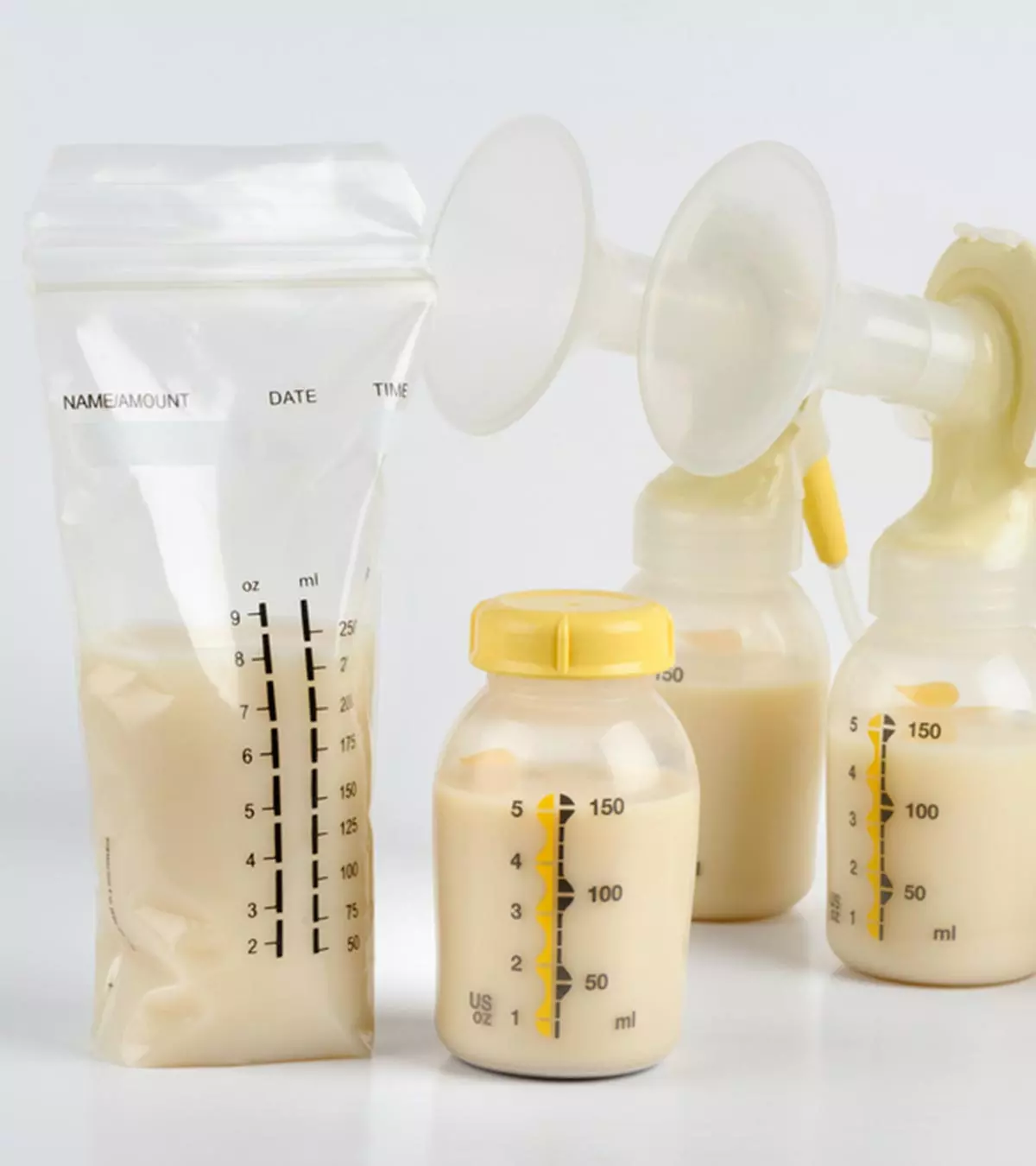
Naproxen is an anti-inflammatory drug that is most commonly used for treating headaches, cramps, or similar kinds of pain. So, is it safe to use naproxen while breastfeeding? We will help you find the answer to this question in this post.
Lactation and breastfeeding is a sensitive time for both the mother and the infant as the food and health of the mother directly affect the baby’s well-being. Many mothers may need medications, such as naproxen, after delivery for postpartum pain relief. But it is important to make sure that the medication does not impart any harmful effects on maternal health or infant’s health while breastfeeding them. Therefore, consulting a doctor before starting a course of medications is necessary to avoid unwanted side effects and long-term complications in infants.
Read on to know about the safety of naproxen for you and your baby.
Key Pointers
- Naproxen is an anti-inflammatory drug commonly used to treat headaches, cramps, or similar pain.
- Naproxen use while breastfeeding is considered safe due to its lower rate of transfer into breast milk.
- Long-term use of naproxen during breastfeeding may harm the infant as compounds from the pills may transfer and collect in the child’s body.
- Naproxen use while breastfeeding can cause side effects such as dizziness, drowsiness, heartburn, hives, constipation, confusion, etc.
- To minimize risk to the nursing child, take the dose immediately after breastfeeding.
What Is Naproxen?

- Naproxen is an analgesic that falls under the class of drugs known as NSAIDs. NSAIDs or Non Steroidal Anti-Inflammatory Drugs help treat many conditions related to inflammation, pain, and fever (1).
- Naproxen is used for relieving the symptoms of osteoarthritisiA type of non-curable arthritis identified by degenerated cartilage in the joints causing pain, swelling, and stiffness , rheumatoid arthritisiAn autoimmune disease that attacks the lining of the joints and causes inflammation and pain, mainly hands and feet , ankylosing spondylitisiAn inflammation of the spinal cord that may cause the spinal bones to fuse over time , goutiA painful, inflammatory arthritis that is caused by the deposition of uric acid crystals in the joints , and tendinitisiA condition in which the tendons become inflamed either because of overuse, strain, or rheumatic disease . It is also used to treat menstrual pains, muscle aches, headaches, toothache, colds, fever, and symptoms of various other medical conditions (2).
 Quick fact
Quick fact- Naproxen is available as extended-release tablets, liquid-filled capsules, suspension, and gelatin-coated tablets. While regular naproxen tablets are available as over-the-counter (OTC) pills, some forms are available only through a prescription (3).
- Some common brand names of naproxen are Naprelan®, Aleve®, Naprosyn®, Flanax®, Anaprox®, Naprelan 500 and EC Naprosyn.
Naproxen And Breastfeeding – Is It Safe?

So, now that you know what Naproxen is, let’s look at a few facts about naproxen use while breastfeeding.
- Naproxen use for a short duration of time is considered safe during breastfeeding. However, there is always a chance of minimal risk for even drugs that are safe to take while breastfeeding.
- Naproxen use while breastfeeding is considered safe due to the drug’s lower rate of transfer into the breast milk (4).
- Research regarding the safety of naproxen use while breastfeeding is inadequate.
- Lactating women who are breastfeeding their baby and need to take an occasional pill for a headache, then naproxen (Aleve) is considered safe to use.
- Long-term use of naproxen as a painkiller when breastfeeding may pose harm to the infant as the compounds from the pills may transfer and collect in the child’s body.
Side Effects Of Naproxen During Breastfeeding

Naproxen in breastfeeding can cause the following side effects, which can range from mild to severe. Here, we list some of the common ones:
- Dizziness
- Drowsiness
- Hives
- Heartburn
- Water Retention
- Excessive thirst
- Diarrhea
- Constipation
- Hearing problems
- Headache
- Excessive fatigue
- Loss of appetite
- Indigestion
- Confusion
- Vision problems
Side Effects Of NSAIDs
There are several side effects with the use of NSAIDs. The below risks are greater for people who consume more than three alcoholic drinks on a daily basis or are generally in poor health.
- Use of NSAIDs such as naproxen is associated with increased risks of heart attacks, strokes, and other cardiovascular problems.
- Naproxen is also known to increase the risks of intestinal/stomach bleeding and ulcers.
- NSAID use can be harmful for those with a history of diabetes and hypertension (5).
 Point to consider
Point to considerMedicine Use While Breastfeeding
If you are a new mother, your concern about your medication use affecting the quality of your breastmilk is genuine.Here are some facts about medicine use while breastfeeding
- All medicines affect the breast milk quality to some extent. Some drugs may do so in a mild way while others more severely.
- Medicines in breast milk can harm preterm babies, newborns and sick infants to a greater extent than babies who are older than six months and in good health.
- New mothers need not stop the use of all drugs when breastfeeding their child. However, you must exercise caution before starting or stopping any new drug. If you’re pregnant and taking medication for a chronic condition, it’s important to talk to your doctor about the potential risks to your baby and undergo a thorough risk assessment before making any decisions about continuing or switching medications. If you need to take any drug for a few days to treat a serious health problem, cessation of breastfeeding your child is a better option than exposing them to any risk from medicinal compounds. You can supplement their diet during this time through infant formula or as per your doctor’s advice.
Tips To Reduce The Effect Of Drugs In Breastmilk
If you can’t avoid taking a certain medication due to a serious health condition, some precautions may be necessary while you are nursing your child.
- Here are some tips to minimize risk to your nursing child due to compounds present in your pills.
- Take your dose immediately after you breastfeed your child to minimize the risk of drug exposure to your child.

- Before taking your dose, you can express your breastmilk for your child’s next feeding to further reduce their exposure to medicines. If you notice any adverse symptoms in your child after breastfeeding, immediately inform your doctor about it.
- If you are planning your pregnancy and you suffer from any chronic condition such as arthritis or are undergoing a lengthy treatment for the same, it is better to discuss it with your doctor before you conceive.
 Quick tip
Quick tipSome Safety Precautions With Naproxen Usage

If you are pregnant or breastfeeding, you must refrain from taking even OTC naproxen pills. It is better to take any medicine, even if it is OTC pills for simple aches and fever, only after the approval of your doctor.
- If you are planning your pregnancy, talk to your doctor about any health condition you have requiring you to take NSAIDs such as naproxen.
- Follow-up with your doctor about your use of naproxen for any chronic condition and seek alternate treatment if possible for the duration of your pregnancy and while you nurse your child.
- Breastfeeding is rather essential for the good health of your newborn. Do not let your use of naproxen or any other drugs deprive your child of this nutrition. Seek information about safe use of drugs while breastfeeding and alternate treatment methods whenever possible. Such information may help you manage your condition without harming your nursing child.
Frequently Asked Questions
1. How long does naproxen stay in breast milk?
Research suggests that naproxen is the highest in breast milk after four to five hours of intake and starts to reduce in its level after 12 to 24 hours of intake (6).
2. What should I not mix with naproxen?
Taking other non-steroidal anti-inflammatory drugs (NSAIDs), such as ibuprofen, with naproxen is not recommended. Additionally, you must consult your doctor before mixing medications such as steroids, diureticsiSubstances that enable the kidneys to produce more urine and get rid of the excess fluid from the body , antidepressants, and medicines for heart problems, blood pressure, and rheumatoid arthritis (7).
3. Should I take naproxen in the morning or at night?
Based on an animal study, naproxen taken during the daytime rather than at night or before bedtime may be more effective. However, you must consult your doctor about the right time to take the medicine to minimize its exposure to your baby (8).
4. Do I need to pump and dump after taking naproxen?
It depends on the timing of your dose and when you plan to breastfeed your baby. Since the concentration of naproxen is highest after four to five hours of intake, pumping and discarding breast milk during this time can help reduce the amount of naproxen in your milk.
5. Can naproxen affect my baby’s renal function?
No scientific evidence suggests an association between naproxen intake while breastfeeding and a baby’s renal function. But, it may affect the baby’s renal function if suffering from preexisting renal impairment or dehydration.
6. How do I minimize the risks of taking naproxen while breastfeeding?
Taking the lowest effective dose for the shortest possible duration is recommended. It is also important to wait for at least 12 to 24 hours before breastfeeding again after taking naproxen and to monitor your baby for any signs of side effects or complications. If you notice any side effects in your baby after taking naproxen, have them evaluated by a pediatrician.
Most postpartum women usually consider taking Naproxen for relief from pain after delivery. But specific side effects such as diarrhea, water retention, and fatigue might develop in the baby while the mother is breastfeeding. However, if you need these pills, you should take them right after feeding your baby. Having small amounts of Naproxen while breastfeeding can be considered safe, but only your doctor can determine the right dosage to be used.
Infographic: Things To Know Before Taking Naproxen While Lactating
Although naproxen is generally considered safe during breastfeeding, there are some potential side effects. Hence, breastfeeding mothers need to be mindful of the frequency of naproxen dosage to protect the baby. This infographic will brief you on the essential information to know about the medicine. Illustration: Momjunction Design Team
Illustration: Is It Safe To Take Naproxen When Breastfeeding?

Image: Dall·E/MomJunction Design Team
References
- NSAIDs.
https://www.nhs.uk/conditions/nsaids/ - Naproxen.
https://www.nhs.uk/medicines/naproxen/ - Naproxen.
https://medlineplus.gov/druginfo/meds/a681029.html - Sharon Gardiner; (2001); Drug Safety in Lactation.
https://www.medsafe.govt.nz/profs/puarticles/lactation.htm - Naproxen Tablets USP.
https://dailymed.nlm.nih.gov/dailymed/drugInfo.cfm?setid=177f0371-46e7-4527-8381-0067cad57025 - Naproxen.
https://www.ncbi.nlm.nih.gov/books/NBK501044/ - Do not take naproxen with other medicines and herbal supplements.
https://www.nhs.uk/medicines/naproxen/taking-naproxen-with-other-medicines-and-herbal-supplements/ - NSAID Timing: Daytime Use Might Be Better than Nighttime Use.
https://creakyjoints.org/living-with-arthritis/treatment-and-care/medications/nsaid-timing-day-better-than-night/ - About naproxen.
https://www.nhs.uk/medicines/naproxen/about-naproxen/
Community Experiences
Join the conversation and become a part of our nurturing community! Share your stories, experiences, and insights to connect with fellow parents.
Read full bio of Dr. Dur Afshar Agha
Read full bio of Jessica Albert
Read full bio of Rohit Garoo
Read full bio of Vidya Tadapatri





















